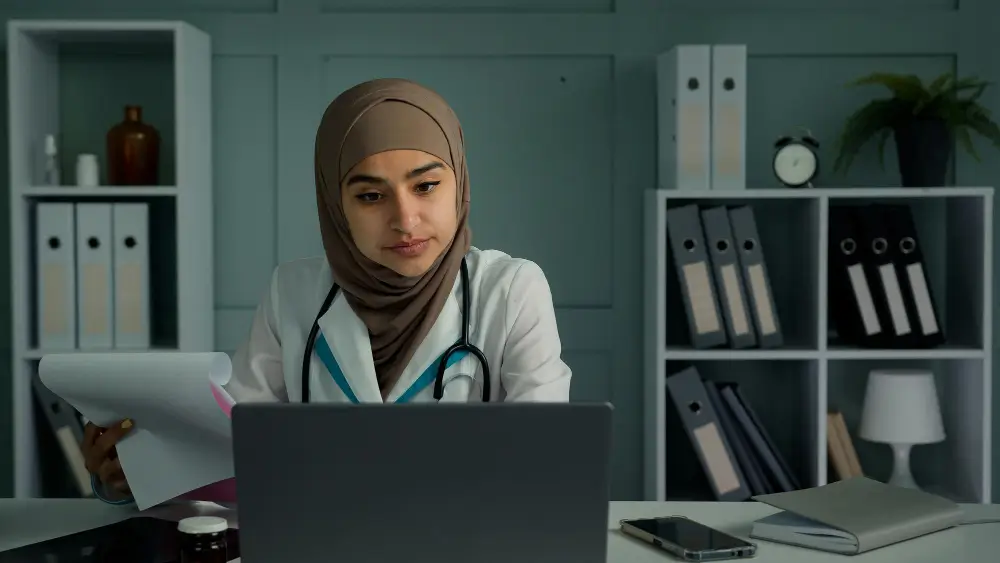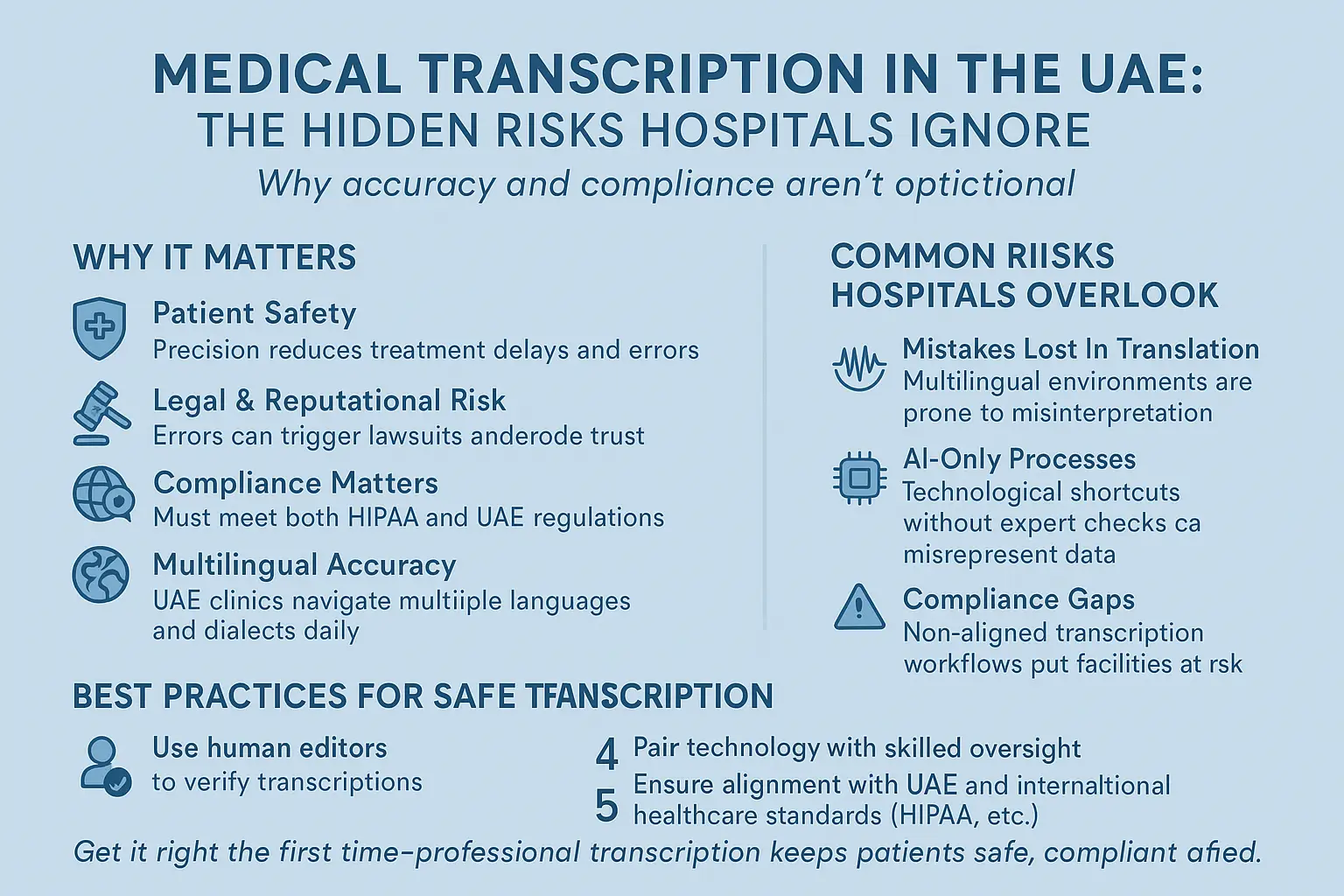
TL;DR: In the UAE, medical transcription must be accurate and compliant to avoid legal trouble, protect patients, and keep healthcare operations running smoothly. Errors can trigger lawsuits, delay treatments, and damage trust, so professional transcription support is critical for hospitals, clinics, and telemedicine services.
Key Takeaways:
Medical transcription is more than just typing out notes from a doctor.
In the UAE’s fast-growing healthcare sector, it plays a critical role in ensuring accurate patient records, meeting strict compliance rules, and maintaining trust between hospitals, clinics, and their patients.
In the UAE, doctors treat patients from every corner of the world, often switching between languages in a single day.
In that setting, a single transcription slip like mishearing a drug name or mistranslating a term can derail a diagnosis or treatment plan.
That’s why medical transcription in Dubai and across the UAE needs a sharper focus on precision and strict compliance.
In a healthcare environment where every detail matters, getting the words right can mean the difference between life-saving treatment and a dangerous oversight.

Healthcare providers in the UAE must follow both international and local regulations to protect patient data.
While HIPAA (Health Insurance Portability and Accountability Act) is a US regulation, many UAE-based healthcare providers adopt HIPAA principles to maintain high privacy standards.
Locally, the UAE Personal Data Protection Law (PDPL) also requires strict safeguards for patient information.
Failure to comply with these rules can result in substantial fines, potential suspension of operations, and loss of accreditation, in addition to serious damage to a medical institution’s reputation and patient trust.
A major challenge in the UAE is managing multinational teams, each bringing its own habits and compliance expectations from different healthcare systems.
Getting everyone on the same page calls for clear, easy-to-follow protocols and the steady hand of skilled transcription experts who can keep documentation consistent and compliant.
If your organisation also handles translated medical documents, knowing the difference between general translation and certified translation can be critical.
This guide on certified document translation explains why it’s often necessary for legal and compliance purposes in healthcare.
Medical transcription isn’t just about typing quickly while listening to a recording.
It’s about really knowing what those complex medical terms mean, and putting them into the record in a way that’s crystal clear for the doctors, nurses, and other staff who rely on that information to care for patients.
In Dubai, hospitals often deal with patients speaking Arabic, English, Hindi, Urdu, Tagalog, and more.
Translating and transcribing medical records accurately in this multilingual environment requires skilled professionals with both medical and linguistic expertise.
For multilingual documentation, the human touch still matters. Automated tools can help with speed, but when accuracy and nuance are critical, human translation expertise ensures medical terms and patient details are conveyed exactly as intended.
One wrong word or misplaced decimal in a medical report can change a patient’s treatment plan entirely.
For example, mixing up “milligram” and “microgram” may sound like a small slip, but it’s actually a thousand-fold difference that could turn a safe dose into a dangerously high or fatally low one.
Medical transcription services support a wide range of needs for hospitals and clinics.
Discover the full scope of Vision Translation’s medical transcription services in Dubai and how they can support your hospital or clinic.
Errors in medical transcription can be devastating. Beyond the obvious risk to patient health, the consequences can include:
Modern transcription services in the UAE use secure, encrypted platforms to receive and deliver files, reducing the risk of data breaches.
AI-assisted tools can flag unusual terminology or potential inconsistencies, which are then reviewed by trained medical transcriptionists.
With hospitals moving towards electronic health records (EHR), having a secure and easily searchable database is crucial.
Proper transcription ensures that these systems are populated with accurate and standardised data, making it easier for healthcare providers to access patient histories quickly.
While technology speeds up the process, nothing replaces the judgment and experience of a skilled human transcriptionist.
In the UAE’s high-stakes medical environment, the best services combine cutting-edge tools with experienced professionals for error-free results.
The best transcription services don’t just complete a task and move on they have ongoing quality checks in place.
This involves random audits, performance tracking, and regular feedback to transcriptionists, ensuring accuracy remains high over time.

Vision Translation brings years of experience in handling sensitive medical records for UAE healthcare providers.
Our transcription specialists are trained in medical terminology, multilingual documentation, and strict data privacy protocols.
We don’t just transcribe; we ensure your hospital records are accurate, compliant, and ready for immediate use. With a focus on both HIPAA and UAE regulatory standards, we deliver work you can trust.
Don’t leave your hospital records to chance. Partnering with the right transcription service means reducing errors, staying compliant with strict regulations, protecting patients from harm, and preserving both your reputation and financial stability.
Contact Vision Translation today to book a consultation and see how our medical transcription services can help you!
